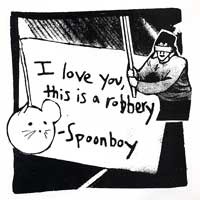This review is probably well past its due date. I Love You, This Is a Robbery came out five years ago, after all. However, and as justification, it was recently announced that my dear friend and partner in alleged crime Spoonboy (lead singer of DC punk-pop heroes Max Levine Ensemble and probable member of secretive thrash punk super group Los Gatos Negros) will be releasing the long-anticipated followup to this album by the end of the summer, though it will be difficult, no doubt, to top Robbery. This CD ranks in soundly amongst my top five all-time life-changing albums, and I'm here to tell you why.
The album opens with "The Restaurant," an in-your-face condemnation of "pseudo-environmental" bourgeoisie that he once worked with briefly in order to attain dental care so that he could have his wisdom teeth removed. Picking this song to go up first has undoubtedly turned off a considerable amount of potential listeners who have never experienced Spoonboy's unique brand of nasally singing. The "whoa-oh"s that make up the bridges of the song kept even me away from putting this album into my rotation for the longest time, but are now a staple of my set list just about every time I'm home alone and showering.
The second track is called "California" and it deals rather poetically with "the notion of escape as a distant thought," calling out everyone who is too grounded in the capitalist rat race to take a risk and drive. A pretty good song in its own right (especially the City of Atlantis verse), it is just a quick taste of what comes far later in the album -- in its sister song, "Philadelphia."
"What You Want" is a song about seeking love and community but finding religion and alcohol instead. It starts out with a mouth fart noise and for a majority of the song it sounds like someone is playing ping-pong. "And you'll drink to the fact that we're human / But I probably won't drink at all / Whatever that says."
"Second Hand Smoke" is another song riddled with one of Spoonboy's trademarks -- weird variants on the "whoa-oh" sound (which can be heard very frequently in Max Levine songs). Looking past the "ooey ooey ooey"s, this is a pretty hard-hitting sing-along about secondhand smoke as a metaphor for hurtful words.
In the next song, "Actions and Words," it seems like Spoonboy's made a decision about the people expressed in "Second Hand Smoke." This song is about people abandoning their ideals and looking down on their former comrades. The line, "I'm not the valedictorian or the ring leader of the crime / I'm just a kid who gets in trouble sometimes" is basically the Cliff Notes for the themes discussed in Robbery.
Next up is the first real one-two punch of the album, "Fireball, or: What I Learned from TV" and "Paint by Numbers." "Fireball" is a song about growing up a latchkey kid, coming home after school and watching Friends because you don't know what else to do, or in fact, that there is anything else to do. It also has a pretty killer organ throughout. "Paint by Numbers" changes the tempo a little bit, but is clearly about the same kids -- the ones who find some sort of freedom and identity in whatever rebellion they can get their hands on, even when they "know it wasn't rock and roll." Spoonboy is a little harsh on these kids, though admits at the end that they HAVE to paint by numbers and KNOW it isn't rock and roll -- holding out hope that they'll become as jaded as the singer.
"Ghost Overseas" splits up the television songs with the highlight of the album. It's a hard-hitting rock and roll song about finding your identity in everyone but yourself. Probably, it also is the time that Spoonboy's voice seems the least abrasive. "Always Leaving" and "My Generation" finally come next, a duo of songs that (thanks mostly in part to the transition between the songs) need to be listened to together.
"Always Leaving" is a love song for everyone who has ever had to leave. Getting past Spoon's choice to elongate the "-in" sound in the word "leaving," this song will probably strike any singer/songwriter at their core. Through lines like "Today I wrote a song / Somehow I know it's not about you / As much as wanting to belong / And have something to connect to," Spoonboy captures the very essence of what writing songs for individuals really is.
"My Generation" (with backup vocals by Chris Clavin of Ghost Mice) is a protest song. It's about being -- and has the power to make you -- so utterly hopeful for "the cause," whatever that is to you, despite also feeling overwhelmed by the pressure to conform into Western culture. Probably the most powerful song on the album, I wouldn't be surprised if it outlives all of us.
"Philadelphia" -- the song I mentioned earlier -- starts wrapping up the album with the story of Spoonboy dropping out of college and traveling the United States. While on the surface this might sound too juvenile and anarcho, it's more moving than any other song of its kind. At least for me. Okay, it might be juvenile and anarcho.
"This Is War..." is the last song on the album and I usually end up skipping it just because I want to get back to "The Restaurant." It's about landscapes and billboards as class war propaganda.
Looking back over it, this review really doesn't do justice to how much this album has touched me. But Spoonboy is really a wonderful person deserving of at least a half-hour of your attention, and I truly believe that this album is the reason "folk-punk" happened. Plus, it's available for a free download on the Max Levine Ensemble's website (and for just $5.00 ppd at Plan-It-X Records)! Give it a try, hopefully you'll thank me.
